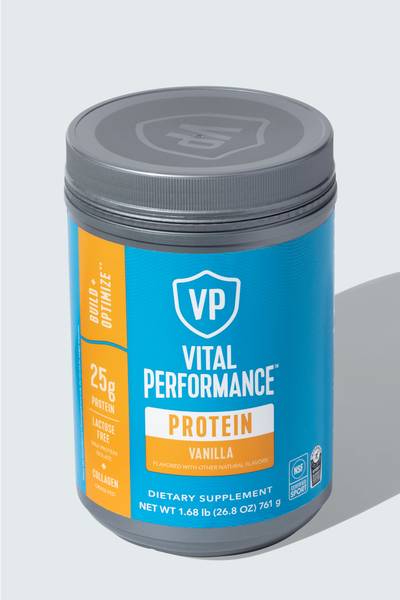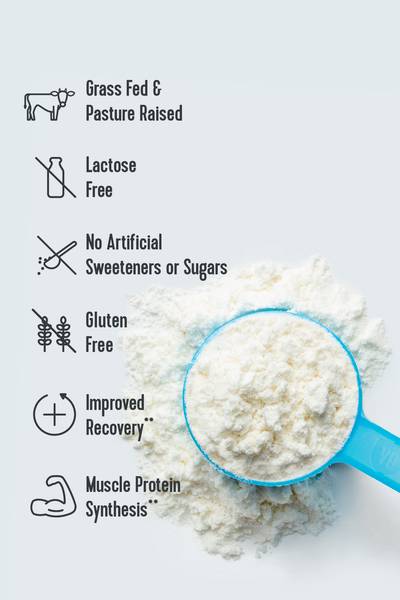As the weather warms up, motivation for new regimens and routines is often sparked by sunnier days. Whether it's a new goal to run a half marathon or try a new gym, it's important to understand proper nutrition surrounding these things to help improve performance and recovery. Below, we dive into these topics to fuel your best exercise yet.
Vital Note: This article has been made available for informational and educational purposes only. It is not intended to be a substitute for professional medical advice, diagnosis, or treatment. Always seek the advice of your physician or another qualified health provider with any questions you may have regarding a medical condition. Your licensed healthcare professional can best provide you with the diagnosis and treatment of any medical condition and assist you as well in deciding whether a dietary supplement will be a helpful addition to your regimen.

What To Eat Before A Morning Workout
If you're a get out-of-bed-and-go type of person, depending on the workout, you may not need additional fuel before exercise. In fact, if you're setting out for a 30-minute workout or less, your body should have sufficient energy stored in the muscles to help fuel it.
However, if you have a big training run on the schedule, or a longer and more intense cardio or strength session, you'll probably want to eat something, even if it's something small. This is key to giving your body an extra boost of energy to increase drive during and to speed up post-exercise recovery after.
For the early bird with something bigger on the schedule, aim to eat mostly carbohydrate-based foods with little fiber and fat (these can cause indigestion and will slow the release of the glucose into the bloodstream). Some good choices here include baked oatmeal, toast with peanut butter or a banana, a fruit smoothie or even a glass of orange juice.
All that said, regardless of whether you eat a small snack or exercise fasted, you should definitely hydrate in the morning. Aim for 16-20 oz. of water before you go on your good morning workout.
Related Articles
What To Eat Before A Late Morning or Early Afternoon Workout
This can be a great time to exercise since you may not need to change the timing of your meals and snacks. If you're a late morning or early afternoon exerciser, you've likely already eaten and digested breakfast.
If you're heading out for a quick workout, you're probably good to go as is. Just ensure you’ve eaten a well-balanced breakfast comprised of protein, fats and carbohydrates 2-3 hours before. If necessary, add a small snack 30-60 minutes before heading out.
That said, if you're doing a more strenuous workout, it may be prudent to add that snack in regardless of whether or not you feel hungry. A granola bar, an energy bite, fruit with low-fat cheese or nut butter or cereal with milk are excellent options.

What To Eat Before A Late Afternoon Workout
Maybe your schedule best allows a workout in the late afternoon after eating lunch. In this case, avoid eating anything too fibrous or high in fat for your meal. For example, a juicy cheeseburger with fries may not sit well for high-intensity training, while a sandwich with turkey and cheese and a side of fruit may fuel you well.
If you have a sensitive stomach, you may want to try eating a smaller lunch and then refueling after your workout to avoid too much food sitting in your stomach at once. Another option is to plan to exercise 2-3 hours after eating lunch to ensure your meal is digested.
If you find that your workouts feel flat or lethargic, try consuming a small carbohydrate-based snack 30-60 minutes beforehand, like a piece of fruit, bread or a ½ cup of rice. If you’re planning for a strength session, you could add some protein to your snack, like deli meat, a small smoothie or a Vital Performance™ Protein Bar. Try to avoid high fiber options, such as beans, which may cause stomach pain and indigestion.
What To Eat Before An Evening Workout
For the person who exercises after work in the evening, there is also some strategy involved. Most people are probably exercising before dinner, so the lunch and afternoon snack become essential. The afternoon snack not only bridges the gap between lunch and dinner, but also provides direct fuel for the evening workout session.
Make sure you're eating a balanced lunch with complex carbohydrates, protein and some fat. In this case, the afternoon snack should be a little larger and consist of mostly carbohydrates and protein. Aim to finish it 30-60 minutes before your exercise session (or consume it on the way).
For a good rule of thumb, the closer to exercise you are consuming your snack, the more predominantly carbohydrate-based it should be to avoid stomach pain and discomfort. Choose quick-acting carbohydrates, like white bread, white rice or cereal, if you are sensitive to the effects of fiber.
Now that you're fueled and ready to go — enjoy your workout!















